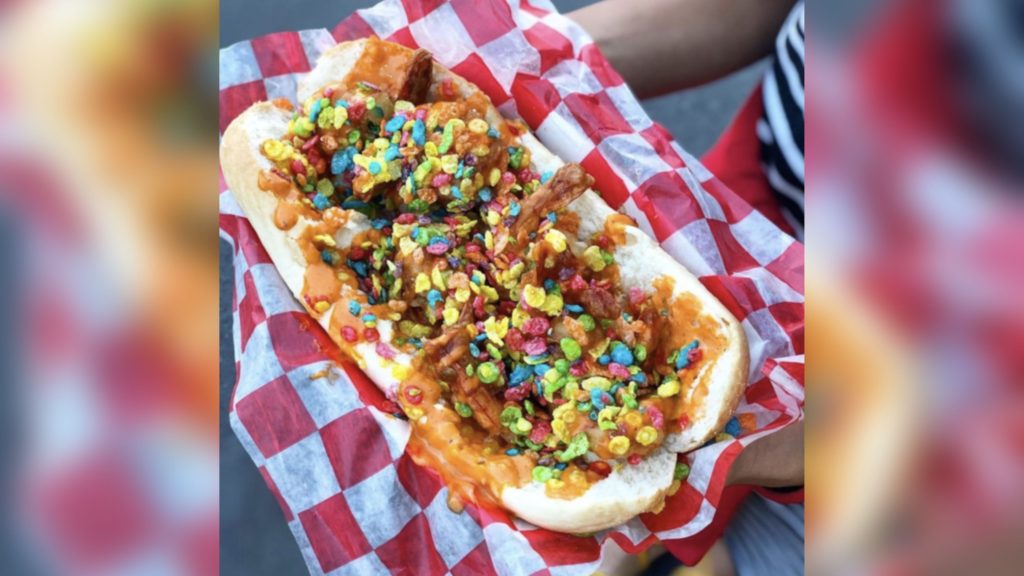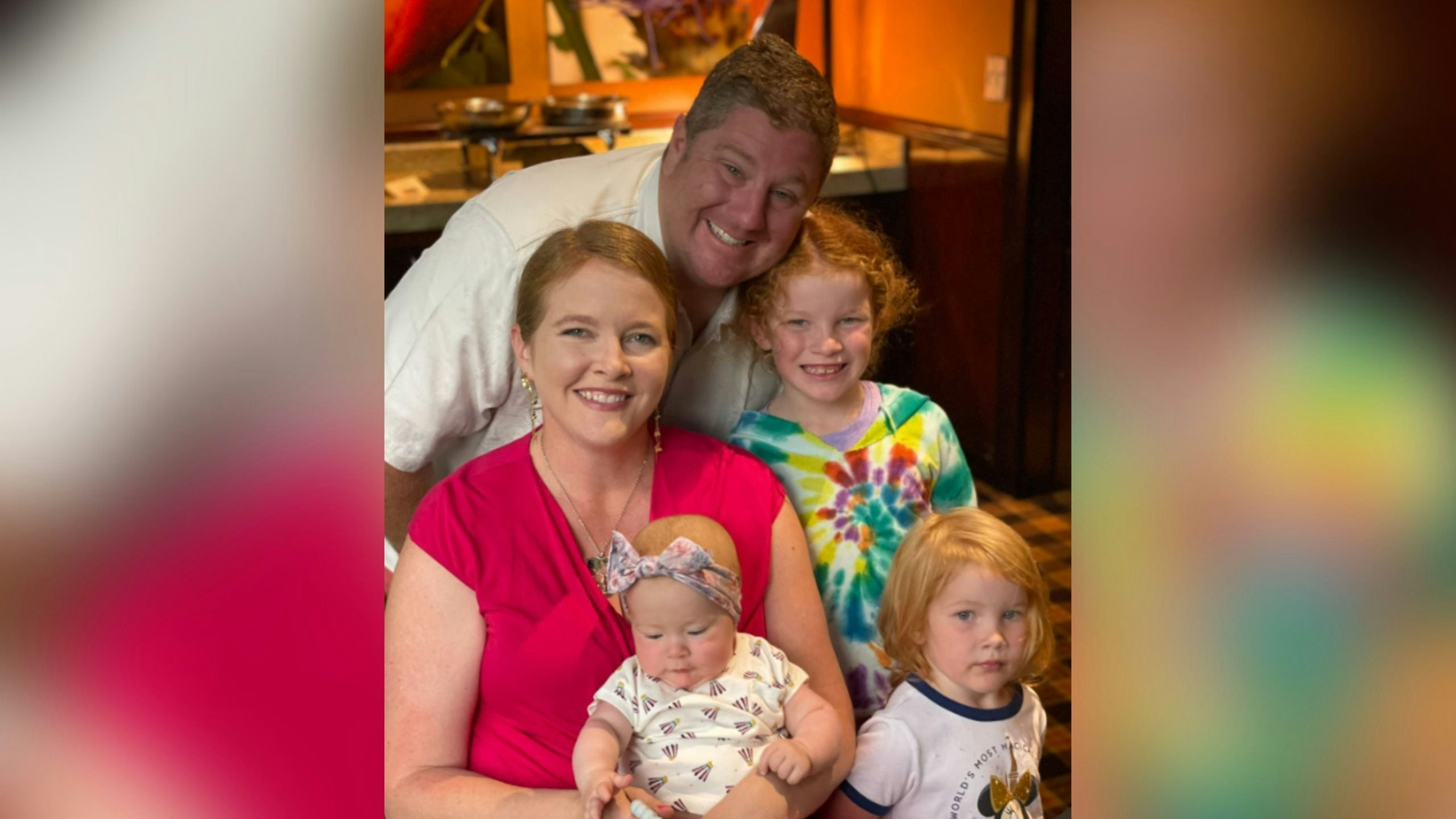By Clair McFarland, Cowboy State Daily
Hunger, courage, and a good wife helped Nate Janousek become the lone caterer for the largest outdoor rodeo in the world.
Now overseeing 400 staffers and 55 food stations at Cheyenne Frontier Days for his third year in a row, Janousek took a few minutes Thursday to catch his breath and remember why he loves feeding unique foods to huge crowds.
Foods like the chicken doughnut sandwich: a pickle-brined Southern-battered chicken patty, fried, nestled in fresh doughnut and drizzled with glaze. Or the Fruity Pebble shrimp po’boy: wild-caught gulf shrimp smothered in a beer- and Fruity-Pebble batter, spiked with cayenne pepper, paprika and seasoned salt; sweltering on a French roll bun.


Then there’s craft beer from nearby farms, grown from this same earth, by the hands that know it best.
And of course, since Cheyenne Frontier Days is a rodeo and this is Wyoming, the brisket sandwich: local angus beef smoked for 15 fragrant hours, rubbed with coarse black pepper, cumin and spicy-sweet sauce, piled onto a bread roll and garnished with pickles and onions.
‘So We Wouldn’t Be Hungry’
All this glory started with an empty pantry.
“We were pretty poor,” Janousek remembered. He was a latchkey kid in an impoverished family, shuffling from one unaffordable Nebraska home to the next.
Home alone with his younger brother and sister, TV cooking shows playing cozily in the background, Janousek scraped the nearly-bare pantry shelves for foods that might go together and, more importantly, that would feed everyone.
“I’d find a way to combine the ingredients in the pantry, so we wouldn’t be hungry,” he said.
At 14 he landed his first job at a Burger King and there learned, wide-eyed, the best systems for speed and efficiency in food-making.
Secret Sauce
As a young man, Janousek put himself through college and earned a philosophy degree. Then in 2006 after graduating he took that philosophy degree – to the carnival.
“Weird, right?” he said. “I’ve always found myself in the food and beverage space.”
Janousek got into carnival catering through a friend named Jason Krueger. For Krueger, Janousek managed eight booths, eventually branching out on his own.
He met his wife, Stephanie, out on the road in 2009. A former student of business and mathematics in Notre Dame, Stephanie Janousek is “the glue that holds the whole thing together.”
“I have all these wild ideas, and I always think, ‘We can do everything.’ And she tells me when, and what we can afford. And what we cannot,” he said. “That’s really been the secret sauce, if we’re being honest: my wife and I together.”
Both passion and a penchant for risk are vital to a good cook, said Janousek. But a business owner has to live in a practical reality too, and that’s where Stephanie comes in.
The pair have been married for 10 years and have three daughters, Audrey, age 7, Sophia, 3, and Olivia, 10 months old. Their catering business, Fun Biz Concessions Inc., keeps them rolling down the road for nine months out of the year to large events like the Houston rodeo, the Texas and Minnesota state fairs, the Los Angeles and San Diego county fairs, the Greeley Stampede.
But Cheyenne Frontier Days is still the ideal gig: the rodeo accounts for about a third of the company’s gross annual income.
Cheyenne Frontier Days opens Friday and lasts 10 days. It incorporates professional rodeo events and country and rock music concerts. The event has been operating since 1897 – just seven years after Wyoming became a state.
The First Rodeo
Starting small from childhood hunger and a traveling carnival and growing to running the entire foods service at Cheyenne Frontier Days is the American Dream, said Janousek.
His old carnival’s second stop after he joined in 2006 was Cheyenne Frontier Days, and Janousek said he’d never seen anything like it.
“I couldn’t have imagined at that time, that anybody had bigger food stands, a bigger food operation than what they had out here,” he recalled. “I looked up to that so much.”
He wrote down a personal goal: that he would become the top chef of that rodeo.
And three years ago, he did it.
“My wife and I had to do so many things to be able to come up here and present (our business)… and I’m really proud of us for doing it,” he said.
They employ numerous part-time transplants from other countries like Mexico, El Salvador and Guatemala, all serve-safe certified. Running on H2b, or nine-month work visas, the workers travel with Fun Biz Concessions, sometimes bringing their kids, sometimes leaving their families back home and making occasional visits back home during the busy catering season.
They can have the American Dream too, said Janousek, if they work for it.
“We’re in a meritocracy here,” he said. “People that do more, they get more. But everybody does very well.”
The bustling environment of hard work, the family’s own gains, and the constant push to do better and do more also have their own merit beyond any profit margin, said Janousek.
“We’re showing our children that hard work pays off.”
Courage Behind The Palate
Janousek’s oldest daughter is starting to partake in his unique culinary experiments during the family’s three months off, which they spend at their home in Texas.
Audrey’s ideas don’t always pan out the first time. But, reminded of his feeble early efforts as a kid, Janousek encourages his little chef as often as he can.
“You never want to stifle the creative process,” he said. “Because I’ve had so many bad ones. So many (recipes) I thought were going to be good that were zeroes… I never want to discourage her from helping us come up with those ideas.”
Plus, cooking teases out the courage behind the palate.
“You have to be a risk taker. It’s like anything,” he said. “If you stay in the shallow end and you make it the same way, play it safe, eventually you’ll get bored with it and your customers will get bored with it.”
It’s up to the chef to stay excited by making foods that call his imagination back into the kitchen, said Janousek.
And it’s his own indomitable passion, guided by his wife, fueled by his daughters, that separates his work from what he called the “gimmicky” efforts of other event caterers, he added.
“I know that (passion) comes across. And we hope when people are standing in line waiting for food, they realize they’re in line for something that’s worth the wait – something they’re not going to be able to go out tomorrow and get anywhere else.”





